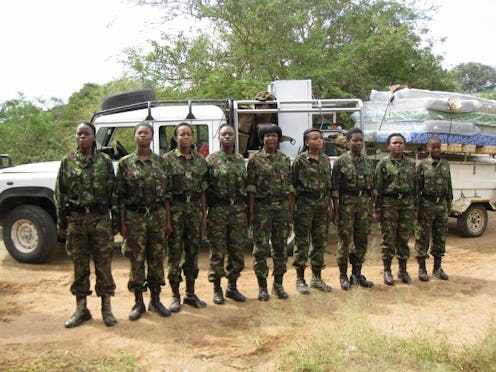News
These Amazing Women Save South Africa's Wildlife

The responsibility of protecting Africa's endangered wildlife usually falls in the hands of men, but one group of South African rangers is changing that. The Black Mambas, an anti-poaching unit made up mostly of women, is helping save the environment by stopping poachers from killing South Africa's leopards, lions, elephants, cheetahs, hippos, and especially rhinos. They're doing such a good job that the United Nations awarded the Black Mambas with the 2015 Champions of the Earth award in the "inspiration and action" category this week, to recognize the "rapid and impressive impact" the unit has made on poaching in the area.
Since the 26-member unit formed to protect the Balule Private Game Reserve in 2013, it has helped arrest six poachers, and put five poachers' camps and two bush meat kitchens out of business. "Their many successes are a result of their impressive courage and determination to make a difference in their community," said Achim Steiner, United Nations Environmental Program (UNEP) executive director, in a press release. "The Black Mambas are an inspiration not only locally, but across the world to all those working to eliminate the scourge of the illegal wildlife trade." They're also proving not only that women can handle this traditionally male job, but also that they can do it extremely well.
The Black Mambas' website says: "It is our belief that the war on poaching will not be won with guns and bullets, but through the local communities and education." The unit, which consists of 24 women and two men, spends 21 days each month patrolling the reserve, monitoring poaching activities, and teaching locals about wilderness preservation. One of the Black Mambas' main anti-poaching tasks is to spot and remove snares, which are loops of wire attached to fences designed to trap and kill animals. The unit has reduced snaring in the area by 76 percent, removing more than 1,000 of the devices.
The UN recognized the unit for their success in preserving South Africa's ecosystem and fighting the loss of biodiversity caused by poaching wild animals. In 2014, a record-breaking 1,215 rhinos were killed in South Africa, as their horns sell for a lot of money on the black market. Steiner said in a press release: "With every rhino saved, the Black Mambas demonstrate that action on a local level is critical to achieving global sustainability and equity."
Black Mamba members must go through a rigorous six-week training program before going out onto the reserve, as working around wildlife can be dangerous — not to mention the possibility of violence from poachers. Leitah Mkhabela, a Black Mamba ranger, told the UN: "I am not afraid, I know what I am doing and I know why I am doing it. If you see the poachers you tell them not to try, tell them we are here and it is they who are in danger."
Images: Black Mamba Anti-Poaching Unit/Facebook (1)